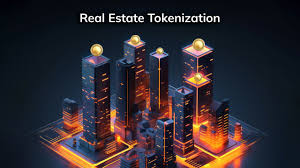1. Introduction to Real Estate Tokenization
Real estate tokenization is revolutionizing the way people invest in property. Traditionally, real estate has been an illiquid asset, requiring significant capital and long transaction processes. However, with the advent of blockchain technology, tokenization has emerged as a method to divide real estate assets into smaller, tradable tokens, enabling fractional ownership. These tokens represent shares in a property and can be bought, sold, or traded on blockchain platforms, making real estate more accessible to a broader range of investors. This introduction to real estate tokenization outlines the basic concept and sets the stage for understanding its impact on the real estate industry.
2. The Mechanics of Real Estate Tokenization
Understanding how Real estate tokenisation works is essential for appreciating its potential benefits. At its core, tokenization involves creating digital tokens on a blockchain that represent ownership in a real estate asset. These tokens are secured through smart contracts, which are self-executing agreements with the terms of the contract directly written into code. Each token represents a fraction of the property, and ownership of these tokens can be transferred quickly and securely through blockchain technology. The use of blockchain ensures transparency, security, and immutability of transactions, reducing the risk of fraud and providing a clear record of ownership. The mechanics of tokenization enable seamless investment opportunities, transforming real estate into a more liquid and accessible asset class.
3. Advantages of Real Estate Tokenization
Real estate tokenization offers numerous advantages over traditional property investment. One of the most significant benefits is increased liquidity. Unlike traditional real estate investments, which often require significant time and resources to buy or sell, tokenized assets can be traded quickly on secondary markets. This liquidity allows investors to easily enter or exit their positions, providing greater flexibility. Additionally, tokenization lowers the barrier to entry, allowing investors to participate with smaller amounts of capital. By dividing a property into tokens, investors can buy fractional shares, making it possible to diversify their portfolios across multiple real estate assets. Furthermore, tokenization enhances transparency and reduces transaction costs by eliminating intermediaries such as brokers and legal representatives. These advantages make real estate tokenization an attractive option for both seasoned investors and newcomers.
4. Challenges and Risks of Real Estate Tokenization
While real estate tokenization offers many benefits, it also comes with challenges and risks that need to be carefully considered. Regulatory uncertainty is one of the most significant challenges facing the industry. Since real estate tokenization is a relatively new concept, existing laws and regulations may not fully address the unique aspects of tokenized assets, leading to potential legal complications. Additionally, the technology itself, while promising, is still evolving. Issues such as cybersecurity threats and the potential for technical failures on blockchain platforms could pose risks to investors. Market volatility is another concern, as the value of tokens can fluctuate based on various factors, including changes in the real estate market and investor sentiment. Moreover, the lack of widespread adoption and liquidity in some markets could make it difficult to find buyers or sellers for tokens. These challenges highlight the importance of conducting thorough research and understanding the risks before investing in tokenized real estate
5. The Future of Real Estate Tokenization
The future of real estate tokenization is bright, with significant potential for growth and innovation. As blockchain technology continues to evolve, more real estate markets are likely to adopt tokenization, leading to increased accessibility and liquidity in the industry. The integration of artificial intelligence and machine learning could further enhance the efficiency of tokenized transactions, providing real-time data analysis and predictive insights for investors. Additionally, as regulatory frameworks develop, we can expect clearer guidelines and protections for investors, which will likely drive more widespread adoption. The potential for global real estate markets to become interconnected through tokenization could open up new investment opportunities, allowing investors to diversify their portfolios across different countries and regions. While challenges remain, the ongoing development of technology and regulatory standards suggests that real estate tokenization will play a central role in the future of property investment, transforming the way people buy, sell, and invest in real estate.
Stay in touch to get more news & updates on Qiuzziz!
